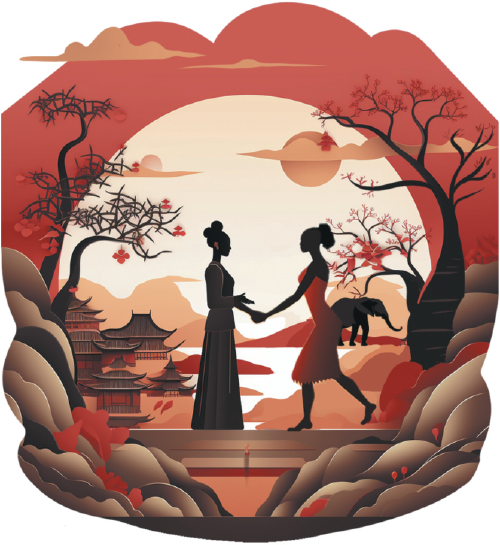Published: August 10,2023
By GETACHEW ENGIDA

MA XUEJING/CHINA DAILY
Instead of taking sides in international geopolitical struggles, the continent is happy to collaborate with countries such as China that treat it as an equal partner
We live in a world of multifaceted challenges. While we have come a long way since the First Industrial Revolution in improving human health, poverty reduction, education, infrastructure and technological innovation, we are still facing unacceptable levels of poverty and income inequality. The World Bank estimates that 700 million people are living in extreme poverty today. Meanwhile, Oxfam discovered that the richest 1 percent grabbed nearly two-thirds of all new wealth worth $42 trillion created since 2020, almost twice as much money as the bottom 99 percent of the world’s population.
The fact that millions of African people lack access to basic services such as clean water, primary healthcare and daily bread is unacceptable. Furthermore, this situation exists because of political choices, not because of a lack of resources. After all, we live in a world of plenty where we waste approximately one-third of the food we produce — enough to feed three billion people. This cannot be allowed to continue. It is not only highly immoral, but a travesty of justice.
Sadly, the multilateral system that emerged after World War II is broken. Many of the international institutions have no teeth to implement their mandates. They are not well resourced and are increasingly politicized. The world is not unipolar, as was assumed by many after the collapse of the Soviet Union in the 1990s.
I have been a student of Chinese history and development since my teenage years in the late 1960s and early 1970s. This was a period of national liberation movements across the vast African continent. At this time, Africans fought against the Apartheid regime in South Africa, and colonialism in Angola, Namibia, Mozambique, Zimbabwe and so on. For many Africans, the victorious revolution in China was an inspiration.
As I grew older, I became less and less ideological and more and more pragmatic. My fascination with China, however, continued. I was captivated by former Chinese leader Deng Xiaoping’s powerful message: “It doesn’t matter if a cat is black or white, so long as it catches mice.”
Since China’s reform and opening-up, it has grown by leaps and bounds, transforming itself from the sweat factory of the world to an economy that is driven by technological innovation. Its higher learning institutions such as Tsinghua University and Peking University are the world’s top-ranking universities. Its high-tech companies such as Huawei, Haier, Alibaba and TikTok compete successfully on the world stage. China has lifted more than 800 million people out of abject poverty. According to the International Monetary Fund, in 2022, China became the largest country in GDP, based on purchasing power parity. China’s position is followed by the United States, India and Japan. This is a remarkable achievement never seen before in the history of economic development.
As an African, I get angry and upset when certain groups in the West accuse China of debt trap diplomacy in African countries. Africans, and others of course, have suffered under the yoke of Western domination for years. The pains of slavery, colonialism and now neocolonialism are still fresh in our minds.
The hopes for economic development in Africa post-independence were deleteriously undermined in the 1960s and 1970s through the Structural Adjustment Programs imposed by the International Monetary Fund and the World Bank. Many African countries still suffer from the undue influence of their colonial and neo-colonial rulers today.
In my former role as the deputy director-general of the United Nations Educational, Scientific and Cultural Organization, I had the opportunity to travel and interact with many African leaders while visiting multiple investment projects. Chinese investments in Africa reached a staggering $3.43 billion in 2022.
China’s transformational investments in Africa are immediately visible and include modern airports, inter-city railways, intracity transit systems, factories, industrial parks, power gridlines, highways, ports, hospitals, stadiums, libraries, museums, schools, etc. In the short time between 2000 and 2020, China has facilitated the construction of approximately 13,000 kilometers of railways, 100,000 km of roads, 1,000 bridges, 100 ports and 80 power plants — creating over 4.5 million jobs for Africans along the way. These are investments that have tangible impacts on the development of African countries. Some of these investments are private for-profit investments, others are built with soft-loans, and some are generous gifts from China.
Furthermore, there are many African students pursuing their higher education in Chinese universities. In 2018, there were over 81,000 African students at Chinese universities, and the numbers are growing at a rate of 24 percent a year. While pursuing their education in China, African students are building vibrant communities dedicated to a partnership between China and Africa. Recently, for example, Tsinghua University’s African Students Association celebrated Africa Day with an event on diaspora engagement. China has proven itself to be a very attractive destination for Africans studying abroad, and Africans are demonstrating their enthusiasm for a collaborative relationship with China.
Many of us from Africa are grateful for China’s friendship and support. We are determined to exercise our foreign policies as we deem fit. We assert that there are African solutions to African problems. We refuse to take sides in international geopolitical struggles that don’t concern us. We are happy to collaborate with all countries who choose to work with us as equal partners. China is Africa’s strategic partner and others are welcome to support Africa’s development on mutually beneficial terms. We simply don’t have strategic competitors, rather Africa chooses cooperation as the cardinal principle of engagement with the rest of the world.
As China and Africa cement their partnership further, they will have to monitor what is working and what is not in order to draw lessons and make necessary adjustments. The dedication to nurturing a win-win relationship between China and Africa exists on both sides and will lead to a blossoming future for all.
The author is former UNESCO deputy director-general and co-president of the China-Africa Leadership Development Institute at Tsinghua University. The author contributed this article to China Watch, a think tank powered by China Daily.
China Daily Global
 Africa -China Review Africa -China Cooperation and Transformation
Africa -China Review Africa -China Cooperation and Transformation
